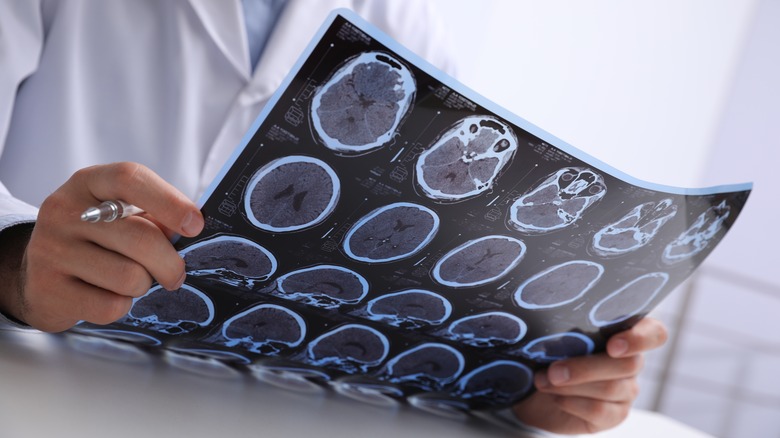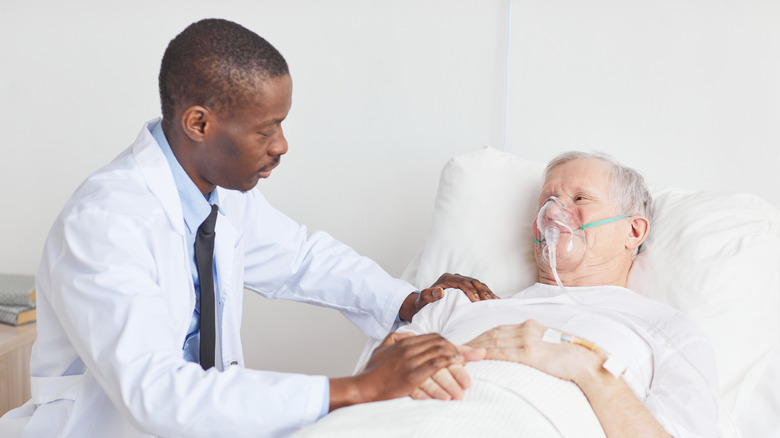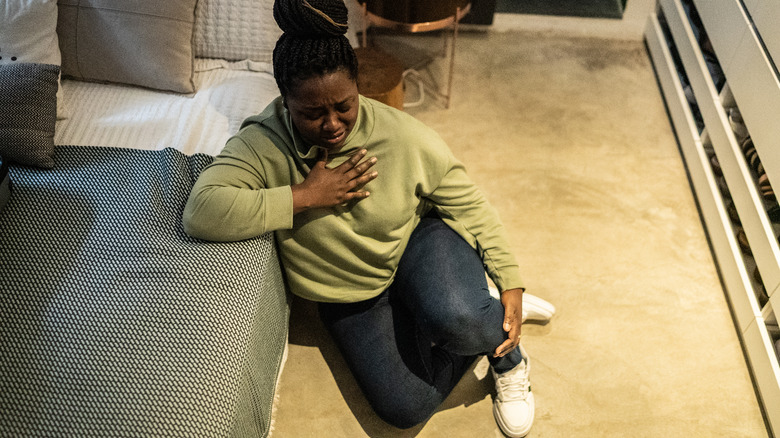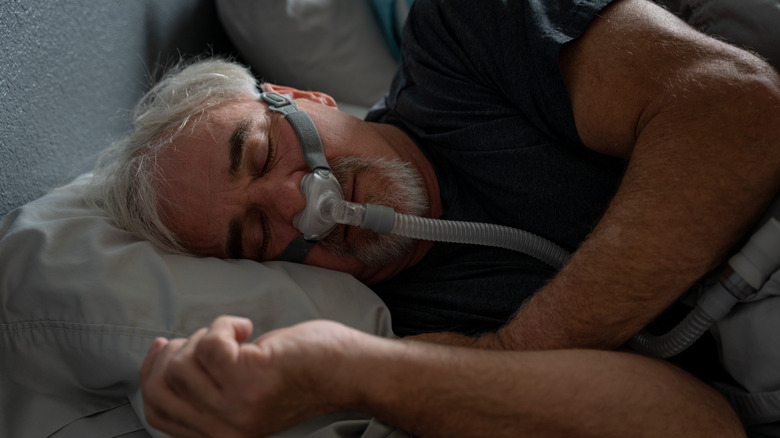The Unexpected Reason You're Having Difficulty Breathing
The Centers for Disease Control and Prevention calculated that in 2020 more than 200,000 traumatic brain injuries (TBIs) requiring hospitalization happened in the U.S. And that didn't even include the head injuries that didn't need a hospital stay. Of those who were hospitalized for a TBI, 32% were individuals aged 75 or older. This type of injury to the brain commonly happens during a fall or accident or while playing contact sports, like football or soccer.
According to the CDC, most TBIs that happen each year are mild TBIs or concussions. They are usually caused by a bump, blow, or jolt to the head which can cause the head and brain to move rapidly back and forth.
The Mayo Clinic states that headaches, ringing in the ears, fatigue, confusion, nausea, and vomiting are common symptoms that can occur days to weeks or even longer after the initial injury. Many people who suffer concussions even lose consciousness, experience mood changes, and forget about the events surrounding the injury.
A lesser-known consequence of a TBI is breathing trouble. The brain is directly linked to how and when you breathe; therefore, damage to an area that controls these functions can lead to abnormal breathing patterns, shortness of breath, or sleep apnea.
We'll explain more about how the brain regulates breathing and how a concussion might disrupt this vital function. We'll also provide you with details about the symptoms to look for and treatment options.
How a concussion might affect breathing
Two brain areas are responsible for respiration and they reside in the lower brain stem. A study published in 2017 in The Journal of Physiological Sciences explains that one respiratory center, which is involved in minute-to-minute control of breathing, is located in the medulla oblongata. The other respiratory center is the pons, which is located just above the medulla. It mainly functions to control the rate or speed of involuntary breathing. Damage to these areas can cause issues with respiratory function and regulation.
Depending on the blow you've received, it can also cause injury to the vagus nerve. A 2018 study in Frontiers in Psychiatry notes that because the vagus nerve is the major sensory pathway between the brain and the lungs it is responsible for crucial body functions like respiratory regulation. Therefore, injury can lead to dysregulation in breathing.
Additionally, Dental Sleep Practice notes that breathing problems from a concussion can often be misidentified as other problems. For example, disturbances in your breathing rate can lead to shortness of breath or dizziness that gets labeled as sleep-disordered breathing problems or exercise intolerance. Knowing what area of the brain was injured during impact and how it's affecting your respiratory patterns is crucial to getting the right treatment options.
Apneustic breathing from a concussion
One respiratory problem people with TBI may experience is apneustic breathing. According to StatPearls (via National Library of Medicine), it's characterized by a deep inhalation followed by a short exhalation. Sufferers struggle with exhaling enough carbon dioxide.
Medical News Today states that the problem happens because of injury to the pons within the brainstem; this area of the brain is responsible for controlling the pneumotaxic and apneustic centers of the brain. Damage causes overstimulation of the apneustic center. Since the pons struggles to determine the expansion of the lungs, the person inhales too deeply but gives a shallow exhale, states Flint Rehab. Carbon dioxide builds up over time, causing dizziness, headaches, and seizures.
Treatment options vary depending on the severity of the injury to the pons. They can include medication and supplemental oxygen to provide the body with enough oxygen to function properly. Severe cases might require a ventilator to ensure proper breathing rate. Respiratory Care also notes that implanted devices can help improve breathing function.
Dyspnea after concussion
Shortness of breath (dyspnea) is associated more with COPD or heart disease but finds its way into patients suffering from post-concussion syndrome (PCS). It's a long phrase to describe when concussion symptoms last longer than normal. About 10%-25% of people deal with PCS, according to the Journal of Clinical Medicine.
Dyspnea can be due to a problem created in the autonomic nervous system (ANS) from the injury to the brain, which is known as "dysautonomia" (per Cleveland Clinic). Your ANS controls all those different functions that you don't, like blood pressure, heart rate, digestion, temperature regulation, etc. Capital Area Physical Therapy & Wellness (CAPTW) states that the dysregulation of this system can show itself most when individuals are engaging in exercise or activity through symptoms like dizziness and lightheadedness. Feeling like you need to force breath and rapid breathing can also be common. Research published in 2014 in Neurology also showed that dysregulation of neurovascular coupling could be to blame for symptoms.
Treatment for shortness of breath and post-concussion syndrome depends on the specific symptoms, but CAPTW notes that exercise can help. Your provider might also prescribe medications and recommend staying hydrated. Supplemental oxygen might be a treatment option.
Concussion can lead to sleep apnea
That concussion you got a few months ago could even be the culprit for your sleep apnea today. Sleep apnea comes in two distinct types, according to the National Heart, Lung, and Blood Institute. The most common type, obstructive sleep apnea, happens when the airways get blocked during sleep, causing you to stop breathing. Central sleep apnea is less common and is due to the brain not sending the appropriate signals to keep you breathing while sleeping.
Patients who suffer from concussions are more likely to develop sleep apnea. The Journal of Clinical Medicine study concluded that "PCS patients are at higher risk for sleep apnea and sleep study should be considered if complaining of non-restorative sleep and/or waking up with headaches, regardless of sex and other known risk factors." Sleep apnea can be particularly dangerous since it can lead to more motor vehicle or work accidents.
To see if you're breathing is affected while you sleep requires either a sleep study at a medical facility or a home sleep test. A few treatment options, like CPAP machines that keep your airway open while you're sleeping and oral appliances, are available. You might also opt to have surgery to remove any blockage that exists, states the Mayo Clinic.





